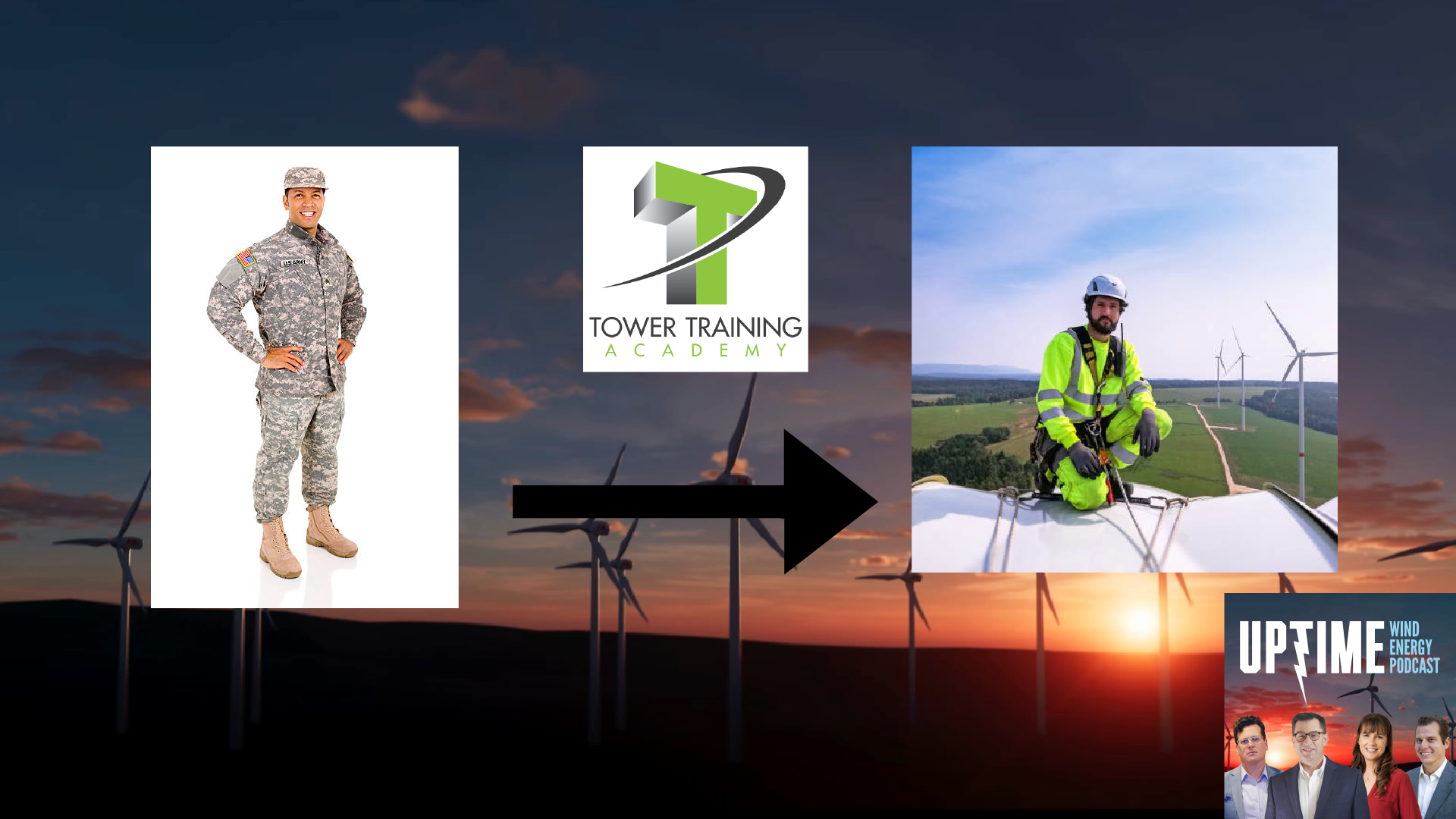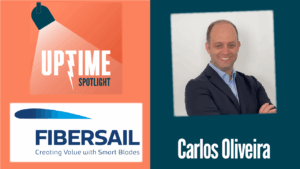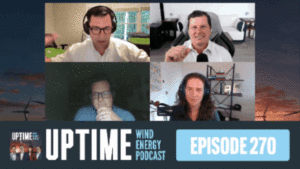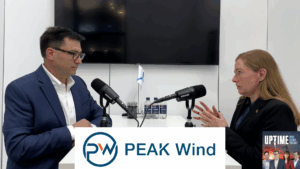Podcast: Play in new window | Download
Nick Martocci, founder of Tower Training Academy and former Marine, joins the podcast to discuss his program that provides comprehensive wind turbine technician training with career development support and job placement assistance. With an accredited apprenticeship program approved by the Department of Labor, Tower Training Academy is well-positioned to help meet the growing demand for skilled technicians in the wind energy industry. Visit https://towertrainingacademy.com/ for more info!
Sign up now for Uptime Tech News, our weekly email update on all things wind technology. This episode is sponsored by Weather Guard Lightning Tech. Learn more about Weather Guard’s StrikeTape Wind Turbine LPS retrofit. Follow the show on Facebook, YouTube, Twitter, Linkedin and visit Weather Guard on the web. And subscribe to Rosemary Barnes’ YouTube channel here. Have a question we can answer on the show? Email us!
Pardalote Consulting – https://www.pardaloteconsulting.com
Weather Guard Lightning Tech – www.weatherguardwind.com
Intelstor – https://www.intelstor.com
Allen Hall: Welcome to the special edition of the Uptime Wind Energy Podcast. I’m your host, Allen Hall, and I’m here with the Chief Commercial Officer at Weather Guard, Joel Saxum. We’re in San Diego at ACP OM&S. We have a special guest, Nick Martocci of Tower Training Academy. Nick is a former Marine and he has a training facility in Las Vegas, Nevada.
Which Joel and I didn’t know about, and we just met you on the floor. And this sounds tremendous, because we’ve been trying to do more outreach to potential technicians, and give them outlets of where to go to become a technician, because every operator in the United States needs people, and they need educated people that are ready to go to work, and we’re just trying to elevate.
All these training facilities yours being one of them. So Nick, welcome to the podcast.
Nick Martocci: Thanks for having me. Yep I know there’s probably some other Marines in there Just wanted to make sure to make the correction once a Marine always a Marine. So He’s a former or prior Marine. I started out in the Marine Corps and then I finished up my career in the Army National Guard as a CH 47 pilot and then as I was making that transition out of the military like a lot of veterans do, I Yeah.
Was playing, Hey, what do I want to be when I grow up? A situation. Yeah. And so I tried a lot of different things. One of the things we naturally gravitate to is obviously security and Sure. Things of that nature. And when I found out, that’s just not where I wanted to be I sprawled out and said, Hey, let me find something else.
And when I eventually found the wind industry, I absolutely just fell in love. Fell in love with the opportunities, the welcoming and familiarity, if you will, of the military as it is. And I just absolutely fell in love. And so that’s why, later on, after I did a lot of different things in the field blade repair, torque contention operations, things of that nature eventually became an instructor and built my own program for GWO, because I knew What individuals were really needing from the certification side, especially having been out in the field and then knowing what the technicians really need to be ready for.
Seeing those gaps. Absolutely. And that’s why for Tower Training Academy, our motto is not just ready for today, but we’re prepared for tomorrow. And so I want to make sure when I built my program, that technicians that are going to be coming out of the field and out of my, or into the field out of my program, Would be ready for today and prepared for everything tomorrow because there’s a lot of booming changes that are going to be going on in the wind industry.
One of the comparisons I make with the wind turbine industry is very similar to the computer industry. When you buy a laptop, a few days later, it’s out of date, because the technology is constantly changing. And that is exactly how things are going in the wind industry. Things are constantly changing.
There’s all types of things we need to, as we say in the Marine Corps, adapt and be prepared for and be able to improvise, adapt and overcome. And so I wanted to create a framework with a program that did just that for the future technicians.
Joel Saxum: One of the things I want to touch on here as well, and this is what really sparked my mind yesterday.
Like Allen said, you walked up, I’ve never seen Tower Training Academy, like that’s a logo you’d remember, that bright green. I’ve never heard of this before, tell us about it a little bit. And one of the things that you, not one of the things, a group of things that you mentioned.
You painted a holistic picture of what you guys do. There’s a couple other little companies there and things. However, you don’t just train people, you’re preparing them for a career. You went all the way down to helping people with their LinkedIn profiles, resumes, job placement, and if they were in the field and it didn’t work out with one ISB, maybe they want to work for an asset owner, re retraining and re providing for them to move to another sector of the industry.
Nick Martocci: Absolutely. I partnered two companies together that I own both Tower Trading Academy and then the acronym IFC, which stands for Infinite Fidelis Consulting. As any other Marine would know Semper Fidelis, but some other Marine got to Semper Fidelis Consulting before I did. And so with IFC, they do all of those soft skills resume writing, interview prep, making sure LinkedIn doesn’t look like Facebook.
Yeah. The two big pieces that they really do. Is not just with the teamwork building piece, but job placement pieces, like you said, and then the C PMP certification for project and program management certification, because I understand that this is a career and so many police other training centers, they leave that bar a lot lower than what it really needs to be and understand that, hey, when you’re getting into this industry, you need to be preparing people for a career.
Yeah. And that’s what I wanted to do with my program is I’m preparing people for a career and win. There are those individuals that, Hey, all they want to do is be a technician for life. Okay, cool. Great. Do that. Hey, I want to be able to take what I have in my wheelhouse and in my background and grow from there.
We’re happy to work with you on that side as well and make sure that, Hey, after a few years you move over into another position, start working on yourself, your career development, and then moving into a company and position that fits and works for you. This is a career that as I tell people, it will take care of somebody anywhere between the next 20 to 30 years.
Easy. Easy. And so if you’re looking for a career where literally the sky is the limit, you’ve said that before. No, the sky truly is the limit in this field. We want to make sure that people are prepared for that. So anyone that comes through Tower Training Academy that is an alumnus will for life have access to IFC.
All you got to do is make a phone call and there will be people there to help you with that resume piece, making sure that, hey, I want to go from here to there. Okay, let’s build that roadmap together and let’s get you there.
Joel Saxum: Okay, so let’s. That’s fantastic and that’s what really drew me to wanting to talk to you to be honest with you because a lot of people It’s generally thought that sometimes a field technician for wind is a four or five year thing because it’s tough, right?
But you guys are prepping with people with the skills to get further in it and create a career not a job That’s important. One of the things let’s touch on this a little bit tower training Academy. Let’s walk through the process So say I am a Green, but I’m green to the industry I’ve never been in before and I call up Tower Training Academy and say, Hey, I want to come and learn how to be a wind tech.
What does that process look like? What does the training look like?
Nick Martocci: As far as the enrollment piece on that side of that part, first, what we do is we talk with that individual and see, Hey, where’s the right fit for them? Is this really truly the right fit? Is this something that you’re really motivated by?
Or is this just one of those really good ideas you had in your head? We want to make sure this is the right fit. And that is the most key first part. After that, then we make sure that they have a tour of the facility. Show them what they’re going to be dealing with. There’s a lot of folks that, hey, we’re working 300 feet in the air.
I want to know if somebody’s afraid of heights, and so we go ahead, we bring them in and just have them look at the training apparatus just from the ground. See if this is something that’s overwhelming and makes them go whoa. Because it’d be a really horrible situation where they spend all this money getting into this career and into the program.
And then all of a sudden it’s yeah, this was a waste of money, a waste of my time. I don’t want that part for them. I don’t want that for my instructors. We bring them in, they go through the tour, then we start going through the enrollment process, make sure they go through the proper procedures and pieces.
Cause if they, what I do is I really screen them for that job. I’ve done hundreds of thousands of interviews myself. Working for and employing new people in the field. So I take that same application to the enrollment form with enrolling into my school. Because if they can enroll into my school, they’ll be ready for any type of career in the wind field.
Because that way they’ll go through those interview prep pieces as well. They’re vetted basically, before they even start. Exactly. That way it makes them a lot more desirable to the workforce industry side where now it’s easy to employ this person and then deploy them out into the field. I like it.
Allen Hall: That’s, wow, that’s fantastic. Who is your prototypical applicant?
Nick Martocci: Right now we’re working with a lot of different veterans. I have a program called Reinvet Yourself. It’s a little play on words with veteran and reinvent yourself. Yeah, cool. And so what we do is we help to get veterans sponsored to be able to go through my program.
And with that part, it gets them through all the certification process. It’s 240 classroom hours with me. And then 11 months OJT in the field.
Joel Saxum: Huge. Wow. I was just thinking this out loud, we need to get him hooked up with Kevin and Will. No, I know. The Atlantic Council for the Veterans Energy Project Vanguard, it’s a bunch of veterans that are pushing to get more of the vets into the wind industry and putting programs for it.
You’d be Fantastic.
Nick Martocci: I’m happy to help however I can. That’s the most important part is just one building the awareness and spreading the word. I think that’s the biggest piece because there’s so many veterans that as they’re transitioning out of the military, they, like I said, the stereotypical thing that we go to is, security or something of that nature.
Every once in a while you have some folks become teachers or real estate and whatnot, and I’m not knocking those professions, but All of a sudden, veterans in their mindset, they just feel very limited and that they’re in a very specific box and they don’t even know about these types of opportunities because these are careers that when they’re hitting the field right out of school, that’s anywhere between 60 to 100, 000 a year that is life changing.
That will take care of a family. And like I said, sustain you for the next 20 to 30 years easy, especially if that’s the introductory phase 100, 000. Not anything to shake a stick at.
Joel Saxum: No, not today. We’ve got salary figured out. You guys do placement, you do training. Who are you connected with?
You don’t have to tell us specifically, but do you have connections from your school with asset owners, with ISPs, in the wind industry to place people?
Nick Martocci: Yes, I have that access to them and I’m able to make a really great announcement today. I haven’t said it to anybody just yet. But we just said January 27th inked out everything with the Department of Labor.
We now have our apprenticeship up and running and ready to go. Everything’s set up with rapids. We’re ready to deploy individuals into the field as an apprentice. And so what I’m looking to do is actually expand that exact thing. So that way I can give these graduates more opportunities and more options of specialties because there’s so many specialties.
Just saying that you’re a wind turbine technician. Just very scratching the surface. There’s so many specialties out there with, major component exchange doing just regular routine maintenance torque and tension, blade repair. There’s so many different options and opportunities for individuals to go through and go to.
That I want to make sure that if somebody wants a specific specialty, they have that opportunity to be able to access that.
Joel Saxum: So I want to touch on this again. If anybody doesn’t know that’s listening, part of the IRA bill, when we go forward and people want to use, get PTC funds and things out of it, one of the new bullet points in it is you’ve got to have people that are part of an apprenticeship program.
As far as I know right now, I don’t know anybody else in a training program that has it set up. And I could be wrong, but I, but, you’re the first one I’ve talked to that actually has accreditation.
Nick Martocci: I know that there are a lot of companies that are looking at setting up. I know that a lot of have already, gotten signed off from the DOL and it’s an internal apprenticeship.
But one that is broadcasted out yet. I don’t know of anybody else other than myself that has set it up where I can go from company A to company B to company C.
Joel Saxum: So if you’re an ISP and you’re looking for people or an asset owner or anybody in the wind industry. You got to give Tower Training Academy a call because they’re the ones that can get people in that apprentice, an approved apprenticeship program and moving them out the door.
Allen Hall: How does a GI bill play into the Tower Training Academy? So it can’t be used. Can those funds be used?
Nick Martocci: So right now it can be, there are pieces that I have to finish finalizing and that will be done towards the end of this month and more guys.
Allen Hall: Okay. And that’s fantastic.
Nick Martocci: My goal is to have that up and running by March, but don’t hold me to that.
I got but no I’m working on that because again, that’s why I also have the. Reinvet Yourself program where what we do is I’ve partnered with a 501c3 and made sure that we can get these veterans the Sponsorships that they need so that way they’re really not paying out of pocket because that’s the most important key I want them to be yeah, they’ve earned it more than earned it I mean the thing that really tugs at my heartstrings is these individuals go overseas They deal with horrible scenarios and situations.
They’re responsible for multiple million dollars worth of equipment And then they come home and the best they can do is Taco Bell or something like that. No, we can do so much better. And then again, like I said, they feel their options are limited. They go to many places and get told, Hey, you’re overqualified.
We can’t bring you on. And I heard that for years and it drove me nuts. And so I want to be able to give those individuals options and opportunities to be able to take care of their families and have a career that they’re actually happy with.
Joel Saxum: A company with a purpose usually succeeds. That’s what that’s just my, part of my background.
Allen Hall: So How many students are there at any one time? And what’s the next training, what’s the training cycle look like?
Nick Martocci: Right now my cap is 12. I’m looking to expand and be able to grow with more instructors as anyone in GWO understands there’s a Instructor to student ratio limit and so I have to stay within that window.
I write, you know exceed that so that’s what’s controlling my cap and my bandwidth so I Worked on that piece as well. And like I said, if there’s anybody else that wants to help out with that I’m happy to listen to all those people.
Allen Hall: Yeah, I think a lot of training facilities are in your same situation, right?
Because everybody’s looking for the top candidates. And it’s a handful. A lot of them come out of the military. That’s the way it should be, right? It’s a good career. It’s a way to move forward and to feed your family. So I think that all makes sense. So how do people get a hold of Tower Training Academy?
And I did see your YouTube page this morning. That’s fantastic. So if you’re just interested in just checking it out on YouTube, you can do that. Absolutely. But how do people contact you, get enrolled, go check out the facility?
Nick Martocci: Yep. All you really truthfully have to do is Google Tower Training Academy.
Okay. It’ll pop up right there to the top. The other thing that most people do with our SEO is make sure that, hey, we have all those hot links where, you know, wind turbine technician training or how do I become a wind turbine technician. We pop up on the first page. We’re right there. Okay. And things of that nature.
One of the other major advantages we have with that cap, if I can go back just for a second. Sure. Is my partnership with ENSA and the ability to access those additional instructors. If all of a sudden I have a class that’s way too large, I can lean on some of my partners and say, Hey, do you have an extra instructor I could borrow and be able to take those on and not have to be stuck, if you will, on that situation.
But that’s usually a case by case basis. Because again, it’s also based off of their availability. Once I’m able to really expand and grow this out the way that I want, yeah I probably will be able to cap out somewhere around 30 students a month.
Allen Hall: Nice. Whoa. Okay. Hey, the wind industry in the United States needs it desperately.
Yep. We need to get the, our training academy filled up and let’s go because this year, next year just even in your neck of the woods, in Sunzea.
Nick Martocci: Actually I’m in I’m
just right around the corner.
Allen Hall: Yeah, just right around the corner. Exactly. There’s going to be a lot of opportunities just down the road from Vegas.
Oh, yeah. In New Mexico, thousands of turbines are going to go in there, starting in 25. Yep. There’s opportunities galore. They got to be looking for hundreds of technicians.
Nick Martocci: Not just that, but also the access to my pipeline of veterans. Yes. These are individuals that are accustomed to going to the other side of the planet, if you will.
Yeah. When I was deploying as a Wintec, as a travel technician, the wife, for me I’d come home six, seven weeks later and she’d be like, didn’t you just leave? We’re used to being gone, 12 to 15 months at a time. Six to seven weeks to individuals like myself, that’s nothing, that’s no problem.
And a lot of the veterans that are coming through my program are looking for that travel technician piece. And being able to just be Six, seven, eight hours away, like you’re saying in New Mexico, is not a huge deal. And then also again, you’re on this side of the planet, so internet works.
Joel Saxum: You can make phone calls on time zones, that makes sense.
Exactly. You don’t have to be at 2 a. m. talking to your kids.
Nick Martocci: Yeah.
Allen Hall: Yeah. No, it makes total sense. It sounds like a great facility. And if you’re interested, you just go online, Google Tower Training Academy. Get a hold of Nick here. Talk about it. Get hooked up. Because if you’re interested in being a Winn.
Yeah. Yeah. Yeah. Now’s the time to get started.
Nick Martocci: Absolutely.
Allen Hall: Nick, thanks so much for coming by the booth and saying hello. It’s been really fascinating to talk to you today. You’re welcome back any time. Let us know how it’s going.
Nick Martocci: Yeah, I appreciate you having me on. And if there’s anything I can do to help anyone, anyone, let me know. And I’m happy to help however I can.











